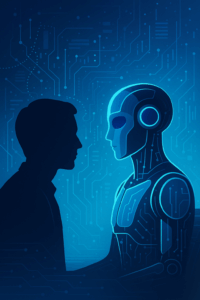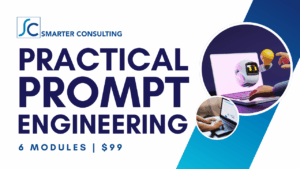AI Companionship, and What It Cannot Replace
I remember seeing the ad for the 2013 movie Her and thinking it was a ridiculous premise. How could someone become so emotionally attached to AI? And yet there’s a quiet shift happening in how people seek connection theswe days. More and more are turning to digital companions, such as AI-driven chatbots, avatars, and voice assistants. Not just for tasks or entertainment, but for feeling heard, for filling the gap when human connection feels thin. For someone who feels lonely, an AI companion can offer something appealing: instant responses, no judgment, always available.
 Here we are in 2025—the year that the movie Her took place, and research shows we’re already in that moment. A recent study of AI companions, synthetic interaction partners designed to mimic friendship or emotional support, found that over the course of a week users experienced measurable reductions in loneliness (hbs.edu). Another study confirmed that people with fewer human relationships are more likely to turn to companion bots (publichealth.gmu.edu). At the same time, a report by Common Sense Media found that roughly 72 percent of U.S. teens had used an AI companion, and about 34 percent admitted discomfort after something the bot said or did (axios.com).
Here we are in 2025—the year that the movie Her took place, and research shows we’re already in that moment. A recent study of AI companions, synthetic interaction partners designed to mimic friendship or emotional support, found that over the course of a week users experienced measurable reductions in loneliness (hbs.edu). Another study confirmed that people with fewer human relationships are more likely to turn to companion bots (publichealth.gmu.edu). At the same time, a report by Common Sense Media found that roughly 72 percent of U.S. teens had used an AI companion, and about 34 percent admitted discomfort after something the bot said or did (axios.com).
So yes, AI companions are rising. But we need to ask: what can they really replace, and what do they threaten to undermine?
Humans Want Connection, But Authenticity Matters
Let’s start with the heart of it: loneliness. We all know what loneliness feels like: disconnected from others, craving conversation, recognition, being seen. In those moments, an AI companion offers something simple: a voice, a response, a feeling of being heard. But there’s a difference between being heard and being connected.
True human connection brings messiness: vulnerability, uncertainty, mutuality, context, and real emotional risk. An AI companion can simulate empathy, yes. Studies show users often report that they feel the bot is listening (hbs.edu). Yet we must remember: bots do not feel. They mirror, they simulate, they respond, but they do not care. At worst, leaning too heavily on AI companionship can blur the line between talking and relating.
And that blur has real risks. One longitudinal study found that heavy use of emotionally driven AI chatbot interactions correlated with higher loneliness, greater emotional dependence on the bot, and fewer real-world social interactions (arxiv.org). At the societal level, the concern is not simply replacement of human contact but a degradation of relational capacities: patience, conflict resolution, and coping when someone doesn’t respond or when relational friction happens.
What AI Companions Can Do, and What They Can’t
Here’s a clearer view.
What they can do:
- Provide a no-judgment, always-available conversation space when human contact is unavailable or difficult.
- Help users practice articulating feelings, exploring questions out loud, and building confidence to engage humans.
- Serve as a reflection tool: you say something, it responds, you see how you sound, how you feel, what patterns arise.
What they cannot (and should not) replace:
- Genuine emotional reciprocity: mutual vulnerability, shared history, unpredictable humanity.
- Human judgment that understands context, prior history, nuance, and health signals.
- Support for those in crisis, severe loneliness, or mental-health decline. Human therapists, friends, and family still matter.
- Long-term relational growth. Every relationship has friction, challenge, and depth. A bot built to please may not help you grow.
Avoid Falling into the Trap
If you’re considering an AI companion (or already using one), here are mindful guidelines.
- Know your why. Are you using the companion to supplement human relationships or to substitute them? Awareness makes the difference.
- Set boundaries on usage. Use the companion as a tool, not the core of your relational life. Track how you feel after sessions. If usage rises and human interaction falls, pause and reassess.
- Keep human connections active. Even if it’s messy or slow, talk to a friend, join a community, schedule real-time human interaction.
- Reflect on your prompts and responses. Your AI responses may mirror your emotional tone. If you’re habitually seeking comfort rather than insight, you may deepen the pattern rather than shift it. This is where prompt engineering comes in.
- Seek professional help when needed. If loneliness, anxiety, or depression are deepening, the companion is not the answer. A licensed human professional is.
The Importance of Solid Prompt Engineering Skills
Just like with any AI interaction, your outcome depends on your input. If you aim for connection, use prompts that explore insight, not just comfort. For example, instead of “Tell me what to do about feeling alone,” try “Help me identify patterns of loneliness I’ve been experiencing and suggest ways to connect with others that feel authentic to me.” That kind of prompt makes the companion work with you, not for you.
 I didn’t start writing this post with the intent of pitching products or services, but if you’d like to learn how to craft prompts intentionally, how to use AI tools as assistants (not substitutes), I did put together an on-demand course called Practical Prompt Engineering that is designed exactly for helping you to strengthen your skillset. The course was designed based on running dozens of AI Foundations workshops with clients around the world, and my own learning from those sessions. It will teach you to use generative AI with purpose and clarity so that you lead the conversation, rather than let the bot lead you.
I didn’t start writing this post with the intent of pitching products or services, but if you’d like to learn how to craft prompts intentionally, how to use AI tools as assistants (not substitutes), I did put together an on-demand course called Practical Prompt Engineering that is designed exactly for helping you to strengthen your skillset. The course was designed based on running dozens of AI Foundations workshops with clients around the world, and my own learning from those sessions. It will teach you to use generative AI with purpose and clarity so that you lead the conversation, rather than let the bot lead you.
To be clear, I’m not here to tell you that AI companions are a bad thing in and of themselves. They reflect a real human need for connection, and they can offer meaningful moments of help and reflection. But you need to remember that they are a mirror, not a bridge. The relationship that really matters is the one you have with other humans and with yourself. Use AI companions wisely, keep your human connections alive, and let technology augment your life rather than replace it.




